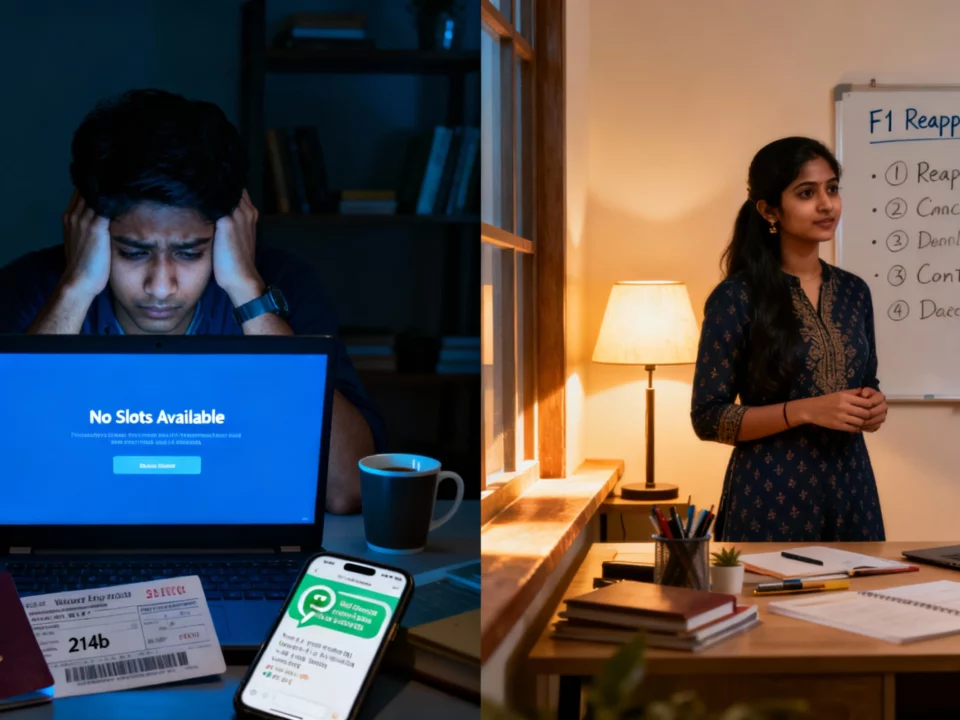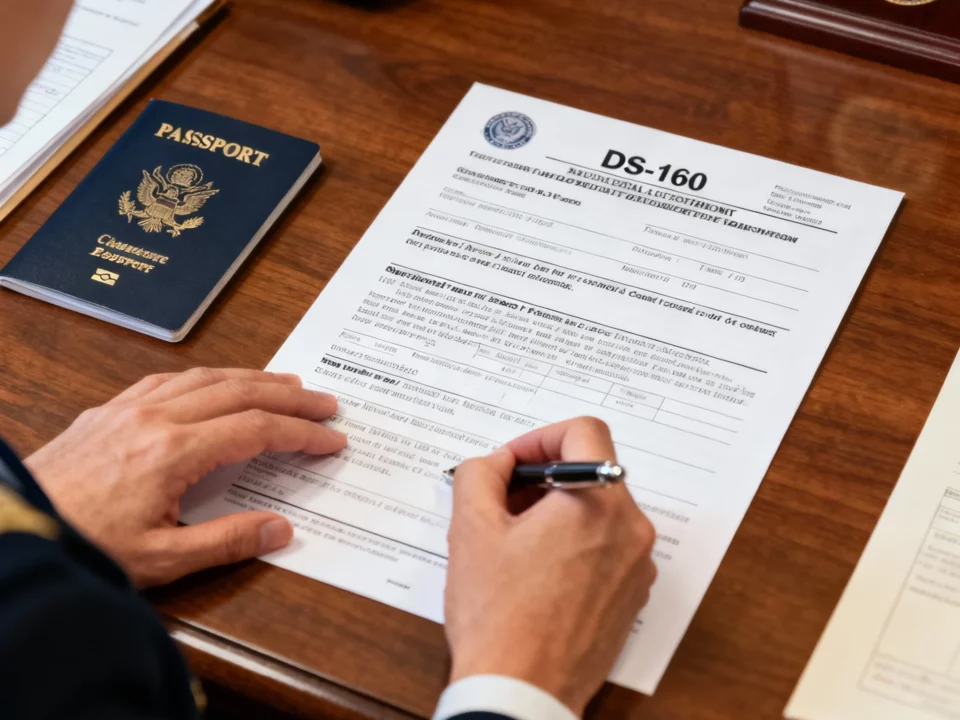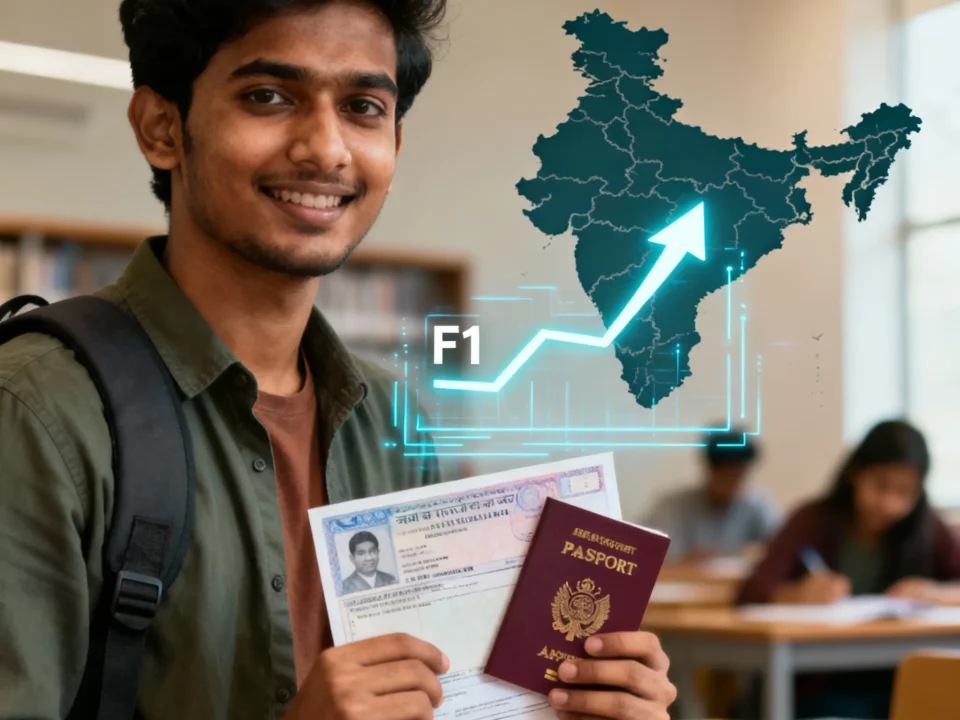F1 Visa Reattempt: Cracking the Code

Estimated reading time: 5 minutes
So, you walked into the U.S. consulate full of hope, clutching your I-20, and came out with that dreaded white slip marked 214(b) and now thinking of F1 visa reattempt
It feels like the end of the world, right?
Table of contents
- First, What Does 214(b) Really Mean?
- Why Generic Advice on Finances Misses the Point
- The Real Battleground: Your Narrative
- So, How Should You Think About an F1 Visa Reattempt?
- Timing Your Reattempt: Should You Apply Immediately?
- Busting the Most Common F1 Myths
- Why 2026 Will Be Tougher—And Why That’s a Wake-Up Call
- Case in Point: Students Who Bounced Back
- Final Thoughts: Your Mindset Matters Most
But here’s the truth: a refusal isn’t the end of your U.S. study dream. It’s a pause button, not a full stop. If you’re thinking about your F1 visa reattempt, the way you approach it makes all the difference.
In this blog, we’ll talk about how students should really think about their next attempt—not the generic advice you’ve probably read online, but the actual pain points that make or break your chances.
First, What Does 214(b) Really Mean?
214(b) is the most common refusal ground. It basically says:
👉 “We’re not convinced about your intent to return home or your overall credibility as a student.”
Notice what it does not say:
- It doesn’t say you’re poor.
- It doesn’t say your education loan is bad.
- It doesn’t say you’re unlucky or cursed by your neighbors’ evil eye (yes, many still believe this in India).
It’s about how you presented yourself and your narrative, not about how much money you showed.
Why Generic Advice on Finances Misses the Point
Most blogs and even some consultants keep saying: “Show more funds, get more sponsors, avoid loans.”
But let’s get real.
- U.S. universities already check your financials before issuing the I-20. If you’ve got it, that means the basic funding requirement is cleared.
- An education loan is not a weakness. It’s one of the most standard ways to fund higher education worldwide.
- Showing double or triple the I-20 amount won’t impress the visa officer. They want to see whether your funds match the requirement—not overflow unnecessarily.
The visa officer isn’t an accountant. They’re a psychologist in that moment, reading your intent, consistency, and confidence.
The Real Battleground: Your Narrative
Think of the F1 interview as less of a “document check” and more of a narrative check.
The officer is silently asking:
- Does your program make sense with your past education and future goals?
- Can you clearly explain why this university, why this course?
- Do you sound like someone who actually has a plan, or someone who is just trying their luck abroad?
If your story doesn’t add up—or worse, if your DS-160 form says one thing while you say another—it creates doubt. And doubt = 214(b).
So, How Should You Think About an F1 Visa Reattempt?
Let’s break it down step by step.
1. Don’t Take It Personally
The refusal isn’t a statement about your worth. It’s about how convincing you were in that short 2–3 minute window. You can absolutely improve for next time.
2. Ask Yourself: What Changed Since My Last Attempt?
Reapplying with the exact same profile and answers is a recipe for another refusal. You need something new:
- A better way to explain your career plan
- Stronger ties to your home country
- An internship, certification, or project that strengthens your academic story
- Even switching to a program that better aligns with your goals
3. Polish Your Interview Skills
Most students underestimate this. The officer isn’t testing your memory—they’re testing your clarity. Practice answering:
- Why this course?
- Why this university?
- What will you do after graduation?
- How will you fund your studies?
And no, “I don’t know” or “my father will handle it” won’t cut it.
4. Match Your Story Everywhere
Your DS-160, your I-20, your answers, your demeanor—they all need to tell the same story. If there’s a mismatch, that’s when doubts creep in.
5. Forget Superstitions
Luck, stars, or “back eyes of relatives” aren’t the reason you got refused. The officer judged you based on what you presented. Period. Believing otherwise only stops you from improving.
Timing Your Reattempt: Should You Apply Immediately?
Technically, yes—you can reapply within days of a refusal. But should you? Probably not.
Unless you have something new to show, rushing back into the consulate with the same story is almost guaranteed to end the same way. Take time to:
- Review what went wrong
- Add something meaningful to your profile
- Practice your answers until they feel natural, not scripted
That’s when your reattempt becomes a real second chance.
Busting the Most Common F1 Myths
- “More money = better chance.” Nope. Match your I-20 requirement, that’s enough.
- “Loans are bad.” Not true. They’re globally accepted.
- “It’s all about luck.” Wrong. It’s about clarity and consistency.
- “If I got rejected once, I’ll always be rejected.” False. Many students succeed in their second or even third attempt with the right changes.
Why 2026 Will Be Tougher—And Why That’s a Wake-Up Call
Here’s something important: the U.S. recently introduced a $100,000 H1B fee (effective from September 2025). What does this tell us?
The U.S. is raising the bar. They don’t want just anyone coming in. They want top talent—students who are serious, clear, and credible.
That means walking into your F1 interview like it’s a college viva won’t work anymore. You need to stand out as someone with purpose.
Case in Point: Students Who Bounced Back
- One student got refused twice because he couldn’t explain why he chose a particular SUNY campus. After working on his answers and aligning his story with his academic goals, he succeeded on the third attempt.
- Another student, fully loan-funded, thought that was the reason for her denial. Turns out, it was her weak explanation of “future plans.” Once she clarified her return path to India, her visa got approved in F1 visa reattempt
Moral of the story: it’s not about the money. It’s about the message.
Final Thoughts: Your Mindset Matters Most
If you’re planning an F1 visa reattempt, stop thinking in terms of documents and luck. Start thinking in terms of clarity, confidence, and coherence.
- Own your story.
- Show the officer that your U.S. education is a stepping stone, not an escape plan.
- Treat the interview as a professional conversation, not a lottery ticket.
Remember: a 214(b) refusal isn’t a dead end. With the right mindset and preparation, your next attempt could be your last—and successful—one.
💬 Chat with our 24/7 chat support team, just tap on that WhatsApp button on the right bottom of your screen 👉



